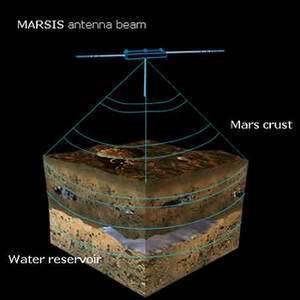Deployment of second MARSIS boom delayed

The deployment of the second antenna boom of the Mars Express Sub-Surface Sounding Radar Altimeter (MARSIS) science experiment has been delayed pending investigation of an anomaly found during deployment of the first antenna boom.
The anomaly was discovered on 7 May towards the end of the first deployment operations. Deployment of the first boom started on Wednesday 4 May. The problem with the boom was confirmed by flight control engineers working at ESA's European Space Operations Centre (ESOC) in Darmstadt, Germany, on 7 May, after which further activity was stopped pending a full assessment of the situation. The decision to delay deployment of Boom 2 pending clarification of the situation and implications was made on 8 May.
Image: The Mars Advanced Radar for Subsurface and Ionospheric Sounding (MARSIS) on board ESA's Mars Express will employ ground-penetrating radar to map underground water (if it exists) on Mars.
Low-frequency waves will be directed towards the planet from a 40-metre long antenna which will be unfurled after Mars Express goes into orbit. The radio waves will be reflected from any surface they encounter. In most cases this will be the surface of Mars, but because low frequencies are used, a significant fraction will travel through the crust to encounter further layers of different material - perhaps even water. Analysis of the echoes produced will reveal much about the composition of the top five kilometres of the crust.
Mission controllers were able to determine that 12 of the 13 boom segments of Boom 1 were correctly locked into position. However, one of the final segments, possibly No. 10, had deployed but was not positively locked into position.
It was determined that deployment of the second boom should be delayed in order to determine what implications the anomaly in the first boom may have on the conditions for deploying the second.
This decision is in line with initial plans which had allowed for a delay should any anomalous events occur during the first boom deployment.
Mission staff will now take the time necessary to investigate the boom situation. Foreseen outcomes include confirming that all segments of Boom 1 have been locked into place and determining how the deployment of Boom 1 may affect that of Boom 2.
All efforts will be made to ensure the safety of the spacecraft overall and to minimise any effects on the operations of ongoing science activity on board Mars Express.
The MARSIS experiment is to map the Martian sub-surface structure to a depth of a few kilometres. The instrument's 40-metre long antenna booms will send low frequency radio waves towards the planet, which will be reflected from any surface they encounter.
MARSIS is one of seven science experiments carried on board Mars Express, one of the most successful missions ever flown to the Red Planet. Mars Express was launched on 2 June 2003 and entered Mars orbit in December 2003.
Source: ESA
















